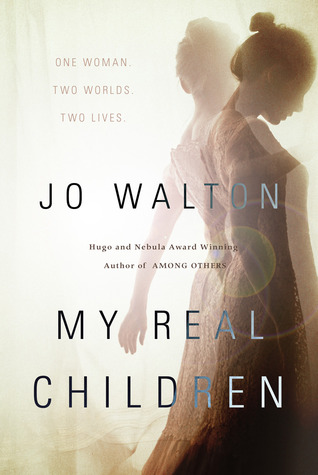I decided that I’m no longer bound by space and time when it comes to book club reads. In other words, I don’t have to wait for a respective book’s month, or even read them in order! Which is why I dug into My Real Children last week, even though it’s not on the Austin Feminist Sci-Fi Book Club docket until June.

Author: Jo Walton
My GoodReads rating: 3 stars
Average GoodReads rating: 3.76
Language scaling: B2+
Summary: Patrician Cowan is living out the end of her life in a care facility for dementia patients. Unlike most dementia patients, however, she also remembers two lives. Which one is the truth? Which children are her real children?
Content warning: Some scenes of emotional abuse; a couple of uncomfortable, coercive sex scenes
Recommended audience: Alternative history fans, actual history buffs, people who are anxious over the life choices they’ve made, readers looking for LGBTQ+ historical commentary
In-depth thoughts: My Real Children takes a very personal, intimate look at history and chaos theory. Walton gives us two (alternate?) lives of Patricia Cowan, with different spouses and different struggles and different triumphs.
Of course, it’s not just Patricia’s life that’s different between the two. History also takes two different tracks (though both are different from history as it tracked in our world). Walton sets up a delicious little tension there that’s never entirely resolved: did Patricia’s choices in any way affect larger world events? Or did those larger world events have any effect on her? Another author might have been tempted to draw a line between Patricia’s choices and world events (like Charles Wallace body-hopping through different people in A Swiftly Tilting Planet), but Walton just leaves those differences there.
While My Real Children is put out by Tor, an imprint famous for fantasy and science fiction, I wouldn’t classify it as science fiction myself. (I was actually surprised to see it was a Tor book!) But maybe that’s because I already comfortably half-accept the idea of there being alternate reality versions of myself leading different versions of my life. There’s no attempt to explain why those lifetimes are converging in Patricia’s memory, or why she’s drifting between two timelines (it’s most certainly not a metaphor for dementia; she has dementia in both lifetimes, unrelated to the timelines crossing); it’s simply a narrative device that shows how differently things can turn out on the micro- and macro-scale.
Whether or not you want to consider it “proper” science fiction, My Real Children is a great option for ESL students: no weird alien races, no futuristic technological terms, no fantastical elements to try and keep straight. It’s simply two alternate histories that readers may already be familiar with, side by side.
